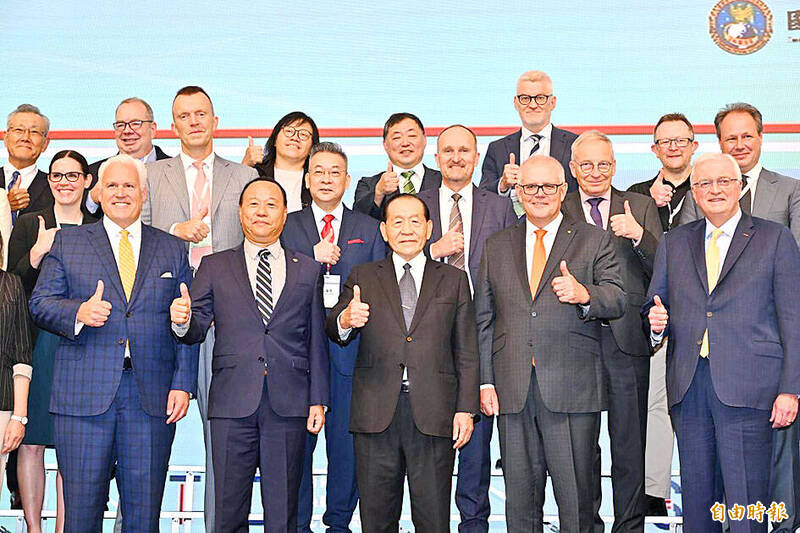Politics
Global Leaders Urge Stronger Support for Taiwan’s Security

Former Australian Prime Minister Scott Morrison emphasized the global significance of Taiwan’s security during his keynote address at the Taipei Security Dialogue on October 19, 2023. He warned that ignoring Taiwan’s defense could have profound repercussions worldwide, particularly if the island were to fall under the authoritarian rule of the Chinese Communist Party (CCP).
Morrison stated, “Taiwan matters to the world,” highlighting that maintaining the current status across the Taiwan Strait is crucial for the security, prosperity, and sovereignty of nations including Australia, the United States, and Japan. He asserted that if Taiwan were to be forcibly integrated into the CCP’s governance, it would not only affect the region but would have implications felt globally.
In his analysis, Morrison pointed out that the loss of Taiwan would significantly diminish the strategic position of the US, as it would necessitate a shift from the first island chain to the second island chain, thus reducing the effectiveness of US defense capabilities in the Indo-Pacific. He noted that the Chinese People’s Liberation Army would gain the ability to exert considerable military influence through critical maritime routes, affecting air and naval traffic throughout the region.
Morrison called for democracies worldwide to enhance collective deterrence, advocating for partnerships such as AUKUS—the trilateral security alliance between Australia, the UK, and the US. He argued that such collaborations are essential to counter the CCP’s aspirations for regional dominance. He acknowledged Taiwan’s strides in bolstering its defense capabilities through cooperation with the US, including the acquisition of advanced weaponry such as Javelin and Stinger missiles, but he stressed that further efforts are necessary.
During the forum, Matthew Schlapp, chairman of the American Conservative Union, remarked on the shifting focus of US foreign policy, stating that America can no longer prioritize Russia over China’s strategic threats. He noted that the administration under former President Donald Trump recognized the CCP as a significant existential threat to global freedom.
Adding to the discussion, Van Hipp Jr, chairman of American Defense International, underscored Taiwan’s critical role in maintaining regional peace. He praised the Taiwanese government’s decision to increase defense spending, calling it a positive development. Hipp highlighted the importance of investing in advanced technologies, such as artificial intelligence, to enhance Taiwan’s military capabilities and operational autonomy.
Former British Royal Navy commodore Peter Olive commented on the challenges of a potential military intervention in Taiwan, stating that any attempt to land troops would be significantly more complex than the historic Normandy landings during World War II. He suggested that China might have to depend heavily on civilian vessels to enforce a blockade, complicating any military strategy.
In his remarks, Philip Shetler-Jones, a senior research fellow at the Royal United Services Institute, emphasized that successful deterrence depends on rendering potential invasions ineffective. He referenced Ukraine’s resilience as a current example of deterrence in action, while cautioning that China might leverage cyber warfare and economic measures to destabilize Taiwan without provoking a US response.
Huo Shou-ye, chairman of the Institute for National Defense and Security Research, concluded the forum by asserting that the stability of the Taiwan Strait is a matter of global concern. He expressed that Taiwan is not seeking confrontation but is committed to demonstrating its capability for effective deterrence. Huo called for collaboration among regional players and like-minded countries to integrate their deterrence strategies, aiming to preserve peace and democracy throughout the Indo-Pacific region.
This dialogue underscores the growing consensus on the importance of Taiwan’s security in the context of global stability, as leaders from multiple nations advocate for a unified approach to counter potential threats.
-

 Lifestyle4 months ago
Lifestyle4 months agoHumanism Camp Engages 250 Youths in Summer Fest 2025
-

 Business5 months ago
Business5 months agoKenvue Dismisses CEO Thibaut Mongon as Strategic Review Advances
-

 Sports4 months ago
Sports4 months agoDe Minaur Triumphs at Washington Open After Thrilling Comeback
-

 Sports5 months ago
Sports5 months agoTupou and Daugunu Join First Nations Squad for Lions Clash
-

 Top Stories5 months ago
Top Stories5 months agoColombian Senator Miguel Uribe Shows Signs of Recovery After Attack
-

 World5 months ago
World5 months agoASEAN Gears Up for Historic Joint Meeting of Foreign and Economic Ministers
-

 Health4 months ago
Health4 months agoNew Study Challenges Assumptions About Aging and Inflammation
-

 Business5 months ago
Business5 months agoOil Prices Surge Following New EU Sanctions on Russia
-

 Entertainment4 months ago
Entertainment4 months agoDetaşe-Sabah Violin Ensemble Captivates at Gabala Music Festival
-

 Entertainment4 months ago
Entertainment4 months agoBaku Metro Extends Hours for Justin Timberlake Concert
-

 Top Stories5 months ago
Top Stories5 months agoRethinking Singapore’s F&B Regulations Amid Business Closures
-

 Business5 months ago
Business5 months agoU.S. House Approves Stablecoin Bill, Sends to Trump for Signature









